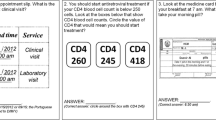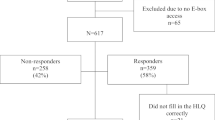Abstract
Health literacy is emerging as a key element for successful medication management and empirical support for the efficacy of numeracy in the health context is rising as well. Little is known, however, about their unique effects among women and men. Given the importance of accurate medication management for effective treatment of HIV, the relation of these variables to medication management needs to be assessed. We therefore tested the relation of health literacy (reading comprehension) and numeracy to one’s ability to manage a “mock” HIV regimen and whether men and women differed in these abilities. Results showed that women were less able than men to follow medication instructions and answer questions about the mock regimen. Numeracy mediated the relationship between gender and medication management. These findings highlight skills used in managing medication regimens and suggest avenues to target for identification and intervention in medication management among women and men with HIV.

Similar content being viewed by others
References
Albert, S. M., Weber, C. M., Todak, G., Polanco, C., Clouse, R., McElhiney, M., et al. (1999). An observed performance test of medication management ability in HIV: Relation to neuropsychological status and medication adherence outcomes. AIDS and Behavior, 3, 121–128.
Ancker, J. S., & Kaufman, D. (2007). Rethinking health numeracy: A multidisciplinary literature review. Journal of the American Medical Informatics Association, 14, 713–721.
Arnold, D. H., & Doctoroff, G. L. (2003). The early education of socioeconomically disadvantaged children. Annual Review of Psychology, 54, 517–545. doi:10.1146/annurev.psych.54.111301.145442.
Baron, R. M., & Kenny, D. A. (1986). The moderator-mediator variable distinction in social psychological research: Conceptual, strategic, and statistical considerations. Journal of Personality and Social Psychology, 51, 1173–1182. doi:10.1037/0022-3514.51.6.1173.
Berkman, N. D., DeWalt, D. A., Pignone, M. P., Sheridan, S. L., Lohr, K. N., Lux, L., et al. (2004). Literacy and health outcomes. Evidence report/technology assessment no. 87 (Prepared by RTI International—University of North Carolina evidence-based practice center under contract no. 290-02-0016). AHRQ Publication No. 04-E007-2. Rockville, MD: Agency for Healthcare Research and Quality.
Casey, M. B., Nuttall, R. L., & Pezaris, E. (1997). Mediators of gender differences in mathematics college entrance test scores: A comparison of spatial skills with internalized beliefs and anxieties. Developmental Psychology, 33, 669–680. doi:10.1037/0012-1649.33.4.669.
Davis, T. C., Wolf, M. S., Bass, P. F., Middlebrooks, M., Kennen, E., Baker, D. W., et al. (2006). Low literacy impairs comprehension of prescription drug warning labels. Journal of General Internal Medicine, 21, 847–851. doi:10.1111/j.1525-1497.2006.00529.x.
DHHS. (2000). Healthy people 2010. Available online http://www.healthypeople.gov.
Estrada, C. A., Martin-Hryniewicz, M., Peek, B. T., Collins, C., & Byrd, J. C. (2004). Literacy and numeracy skills and anticoagulation control. American Journal of Medical Science, 328, 705–710.
Gallagher, A. M., De Lisi, R., Holst, P. C., McGillicuddy-De Lisi, A. V., Morely, M., & Calahan, C. (2000). Gender differences in advanced mathematical problem solving. Journal of Experimental Child Psychology, 75, 165–190. doi:10.1006/jecp. 1999.2532.
Golbeck, A. L., Ahlers-Schmidt, C. R., Paschal, A. M., & Dismuke, S. E. (2005). A definition and operational framework for health numeracy. American Journal of Preventive Medicine, 29, 375–376.
Hall, C. W., Davis, N. B., Bolen, L. M., & Chia, R. (1999). Gender and racial differences in mathematical performance. The Journal of Social Psychology, 139, 677–689.
Hyde, J. S., Fennema, E., & Lamon, S. J. (1990). Gender differences in mathematics performance: A meta-analysis. Psychological Bulletin, 107, 139–155. doi:10.1037/0033-2909.107.2.139.
Kalichman, S. C., Benotsch, E., Suarez, T., Catz, S., Miller, J., & Rompa, D. (2000). Health literacy and health-related knowledge among persons living with HIV/AIDS. American Journal of Preventive Medicine, 18, 325–331.
Kalichman, S. C., Ramachandran, B., & Catz, S. (1999). Adherence to combination antiretroviral therapies in HIV patients of low health literacy. Journal of General Internal Medicine, 14, 267–273.
Kalichman, S. C., & Rompa, D. (2000). Functional health literacy is associated with health status and health-related knowledge in people living with HIV/AIDS. Journal of Acquired Immune Deficiency Syndromes, 25, 337–344.
Kripalani, S., Henderson, L. E., Chiu, E. Y., Robertson, R., Kolm, P., & Jacobson, T. A. (2006). Predictors of medication self-management skill in a low literacy population. Journal of General Internal Medicine, 21, 852–856. doi:10.1111/j.1525-1497.2006.00536.x.
Maddigan, S. L., Farris, K. B., Keating, N., Wiens, C. A., & Johnson, J. A. (2003). Predictors of older adults’ capacity for medication management in a self-medication program. Journal of Aging and Health, 15, 332–335. doi:10.1177/0898264303251893.
MacLaughlin, E. J., Raehl, C. L., Treadway, A. K., Sterling, T. L., Zoller, D. P., & Bond, C. A. (2005). Assessing medication adherence in the elderly which tools to use in clinical practice? Drugs & Aging, 22, 231–255. doi:10.2165/00002512-200522030-00005.
Montori, V., Leung, T., Thompson, C., Chung, J., Capes, S., & Smith, S. (2004). Choice of risk representation to enable diabetes decision-making. Diabetes, 53(S2), A225.
National Institute for Literacy (2005). 2003 National Assessment of Adult Literacy: A first look at the literacy of America’s adults in the 21st century. National Center for Educational Statistics. http://nces.ed.gov/naal/health_results.asp#GenderHealthLiteracy, http://nces.ed.gov/surveys/all/ib_performance.asp.
National Science Foundation. (2001). Science and engineering degrees by race/ethnicity of recipients 1990–1998. Arlington, VA, USA: National Science Foundation.
Parker, R. M., Baker, D., & Williams, M. V. (1995). The test of functional health literacy: A new instrument for measuring patients’ literacy skills. Journal of General Internal Medicine, 10, 537–541.
Waldrop-Valverde, D., & Valverde, E. (2005). Homelessness and psychological distress as contributors to antiretroviral non-adherence in HIV positive injecting drug users. AIDS Patient Care and STDs, 19, 326–334. doi:10.1089/apc.2005.19.326.
Wolf, M. S., Davis, T. C., Shrank, W., Rapp, D. N., Bass, P. F., Connor, U. M., et al. (2007). To err is human: Patient misinterpretations of prescription drug label instructions. Patient Education and Counseling, 67, 293–300. doi:10.1016/j.pec.2007.03.024.
Woodcock, R.W., McGrew, K. S., & Mather, N. (2001). Woodcock Johnson III Tests of Achievement. Itasca, IL: Riverside Publishing.
Acknowledgements
The authors would like to thank Michael Stirratt for his thoughtful review and helpful suggestions in the preparation of this manuscript. We would also like to thank Jesline Jean-Simon for her invaluable recruitment skills. This study was supported by funding from the National Institute of Mental Health grant number MH74664 to the lead author, D. Waldrop-Valverde.
Author information
Authors and Affiliations
Corresponding author
Rights and permissions
About this article
Cite this article
Waldrop-Valverde, D., Jones, D.L., Jayaweera, D. et al. Gender Differences in Medication Management Capacity in HIV Infection: The Role of Health Literacy and Numeracy. AIDS Behav 13, 46–52 (2009). https://doi.org/10.1007/s10461-008-9425-x
Received:
Accepted:
Published:
Issue Date:
DOI: https://doi.org/10.1007/s10461-008-9425-x




